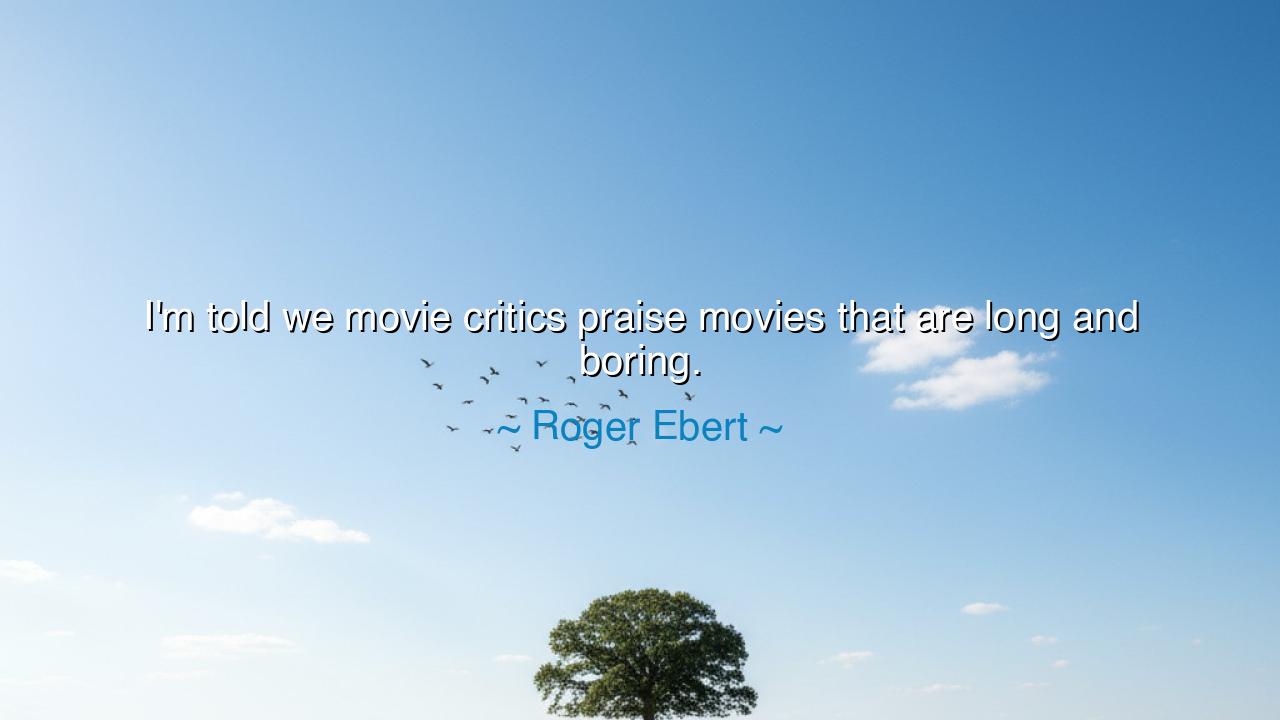
I'm told we movie critics praise movies that are long and






Hear, O seekers of wisdom, the words of Roger Ebert, a man who spent his days seeking truth in the flickering images of cinema. He speaks with the voice of one who has known both the praise and scorn that come with wielding judgment over the art of the film, and he warns us of a curious paradox: “I’m told we movie critics praise movies that are long and boring.” What are these words but an invitation to reflect upon the nature of criticism and the sometimes tangled path that it treads?
Criticism, in its purest form, is not meant to merely affirm, to speak only of what is pleasant to the ear or agreeable to the eye. Criticism is a sword, one that must cut through the veil of illusion and confront the very heart of the matter. But here, in the words of Ebert, we find a disquieting truth: that critics, those who are charged with guiding the audience, have often found themselves swept away by the allure of complexity, by the grandiosity of a story that sprawls like a river across the land, only to arrive at a destination that is less than satisfying. And so, these critics, in their search for meaning, may praise films not for their essence, but for their length and pretension—for the promise of something profound, even when it is not realized.
In the annals of history, this echoes the story of the great philosophers who, in their search for truth, sometimes became so enmeshed in the labyrinth of their own thoughts that they lost sight of the simple, vital truths that lay before them. Consider the ancient Greeks, whose debates, sometimes endless and tedious, sought to uncover the very nature of existence, only for many to leave the agora not with wisdom, but with confusion. Their pursuit of knowledge, though noble, often became an exercise in self-indulgence, wherein the complexity of their discussions was mistaken for insight, and the clarity of simple truths was overlooked in favor of more grandiloquent concepts.
Thus it is with the movie critic who falls prey to the allure of length and grandeur. There is a seduction in complexity, a temptation to elevate what is convoluted and drawn-out to the level of genius. But true art, as the ancients knew, lies not in length, but in its ability to move the soul, to stir the heart, and to make the mind see the world anew. A film is not measured by the number of minutes it occupies in time, nor the pretensions it harbors in its dialogue, but by the depth of its impact on those who watch it.
Take, for example, the tale of César Franck, a composer whose works were often long and intricate, yet lacked the emotional immediacy that would elevate them into the hearts of the common people. His compositions, while full of intellectual merit, failed to ignite the passion of those who yearned for music that spoke directly to the spirit. It was only later, when simpler forms—those that spoke with brevity and beauty—took the stage, that the world began to truly listen. In the same way, many films, while hailed by critics for their complexity, fail to stir the spirit of the audience, leaving them drained by the length and weight of their own ambitions. The soul does not thrive on excess, but on essence.
Thus, the lesson is clear. Let not the length of a film or its apparent complexity deceive you. True artistry does not reside in the ability to fill time with unnecessary detail, nor in the pursuit of intellectual grandeur for its own sake. Art, whether in the form of cinema, music, or poetry, finds its true power in simplicity, in the ability to distill emotion, to reach the heart without the burden of excessive explanation. It is not in the endless labyrinth of complexity that we find meaning, but in the sharp, clear light of truth.
In our own lives, we must learn to avoid the temptation of complexity for complexity’s sake. As critics of our own existence, we should not strive to fill our days with endless, meaningless activity, but seek to focus on the moments that bring us closer to our truest selves. In our pursuits, whether of work, love, or wisdom, let us not be fooled by the noise and chaos of the world. Instead, let us find meaning in the essence of life, in the moments that matter, and in the actions that carry purpose. In every endeavor, seek clarity over complexity, and know that the greatest truths are often those that need not be spoken in a thousand words, but are understood in a single glance.
And so, O future generations, I say to you: measure not the worth of your creations by their length, nor by the weight of their concepts. Seek not to impress with the grandness of your ambitions, but to touch the hearts of those who behold your work. Let brevity, simplicity, and clarity be the true markers of your art. For in the end, it is not the critic’s praise that will endure, but the lasting impact of what you create.






AAdministratorAdministrator
Welcome, honored guests. Please leave a comment, we will respond soon